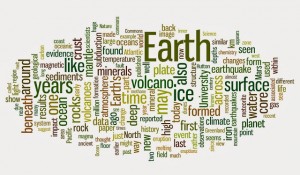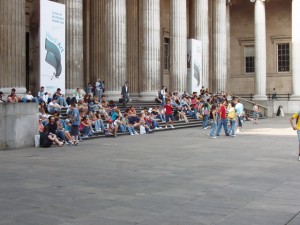As promised, here is the next post in the series I started towards the end of last year: Making the Most of you PhD. This is the third post in the series and I want to cover a subject very close to my heart. (For the previous posts in the series, have a look here and here).
Public Engagement, Science Communication and Outreach is something I feel quite passionately about, but the point of this post is not to tell you why I feel all the above are important. There are a number of people who put the point across, far more eloquently than I could, so if you want further information about why it is important to communicate your research, take a look at the following blog posts and articles:
- Green Tea and Velociraptors. John is a fellow EGU blogger and I had a particular post of his in mind when I started writing this quite a while back. Looking through his blog though, I’ve realised his got far too many fab posts on why it’s important to communicate science and why it is cool. So just click on the sci comm. widget on his blog!
- Why we need Science Communication, by Emily Coren for Soapbox science, Nature.
- Speaking to, a series of posts, a bit like our very own 10 minute interview, where Julie Gould talks to science communicators in her Speaking about Science blog, there are interviews with the likes of Ed Young and Professor Athene Donald.
- The why and how of science communication. A chapter of a book, with a pretty self explanatory title.
The point of this post is to list the opportunities available to you should you agree with me that engagement is important. If you don’t quite know how to get started or just want to be better at it, look no further.
I’ve attended a number of these courses and events myself, so where possible, I’ll give you my views on them. Needless to say, as they’ve made it onto the post, I highly recommend them!
Courses
Public Engagement Course (NERC) –Having attended just a few weeks ago myself, I highly recommend this course. It’ll give a lot of insight into how the media works and how to plan and prepare outreach activities.
Standing up for Science media workshops (Sense About Science) – a one day workshop for early career researchers to get their voices heard in public debates about science. During the workshops concerns about speaking to the public and misconceptions about how the media works are covered. (@senseaboutsci & @voiceofyoungsci).
Spot On London – A series of community events for the discussion of how science is carried out and communicated online. Not strictly a course but a good place to look for resources and a great annual conference to attend for those interested in science policy and communication. (@SpotonLondon).
Conferences
You’ll find a number of conferences also cover topics on science communication and public engagement and there are a number of sessions which you might consider attending. It may also be that you can attend workshops at the conferences too.
- British Science Association Science Communication Conference – The annual event for those involved with public engagement to share ideas and best practice.
- Communicate – UK’s leading conference for environmental communicators. This year NERC funded some NERC funded ERCs to attend the conference. (@Communicate2013)
- Spot On London – Annually held conference in London. Follow this link for what happened in 2013.
- EGU 2014 – The meeting this year (held in Vienna in April-May), has a whole symposium dedicated to the subject. You can find it in the programme under EOS – Educational and Outreach Symposia. There are a number of sessions and workshops on range of public engagement topics.
- AGU Fall Meeting – I can’t seem to find the link to the 2013 programme, but I know there are a number of opportunities at the meeting to explore all things sci comm!
Get STUCK IN!
On top of these slightly more academic routes to learning about this subject, you might just chose to jump in at the deep end and get stuck in. You could do that by proactively engaging your public – I say your public, because it’s up to you to choose your audience. The medium by which you reach them will depend on a number of factors and might determine in what way you engage in science communication. Here are a few options to consider.
- STEM Ambassadors – engaging school aged children with science. As well as being expected to attend a school of public engagement event s a year where you help deliver some sort of outreach activity, there are a number of opportunities for training once you are part of the network.
- CREST Mentor – Mentoring school aged children to help with science projects, via the British Science Association. The scheme recently featured in another of the EGU blogs.
- Science Grrl – Because Science is for everyone. A similar set-up as the STEM network, but specifically to encourage young girls into science. Opportunities include delivery of practical activities to school children, involvement with larger outreach efforts such as attending science week events etc, or setting up a local Science Grrl chapter.
- I’m a Scientist Get me Out of Here! I’m a Scientist, Get me out of here is a free online event where school students get to meet and interact with scientists. It’s a free X Factor-style competition between scientists, where the students are the judges.

- I’m a geoscientist Get me Out of Here! Is the same idea as the above, but specifically to promote the Earth Sciences. Read all about it in this post.
- Outreach via your institution. A number of institutions proactively seek to engage the communities in their local area. There might be an outreach officer in your department or at a higher levels in your institution, whom you could approach to see how you can get involved.
- Museums. Volunteering at science and natural history museums is a great way of talking to the public about science. The roles you might get involved with are diverse.
Science Writing
I could probably write a whole blog post on this alone… There are so many routes to do this, but here are just a few for you to consider.
- Blogging – If the thought if your own blog is a little daunting, then how about guest blogging for some established bloggers? Dan and I would be keen to host some guest blogs (I’m not saying we are established) and some of our fellow EGU bloggers have hosted guest blogs in the past ( Matt Herod of GeoSphere gave me my first break) and Jon Tennant of Green Tea and Velociraprots is currently looking for guest bloggers.
- The Wellcome Trust Science Writing Prize in association with the ‘Guardian’ and the ‘Observer’.
- The Richard Casement internship -would-be journalist spend three months of the summer working on the newspaper in London, writing about science and technology.
- British Science Association Media Fellowship – spend three to six weeks over the summer working with professional journalist at a media host: national press, broadcast or online media. Calls open in January 2014.
To tweet or not to tweet?
My final words for this post I save for twitter. I may get around to writing up my notes for the discussion panel I was involved with at EGU last year: Blogs & Social Media for Science Communication, but for now let me say this.
Whilst I was originally very sceptical of the advantages of using twitter, I am now a huge advocate. It is a great way of disseminating your science and output, it quite simply gets you out there and raises your profile. As a result, it is possible to build the largest network of contacts imaginable and that leads onto opportunities: a job opportunity, an opportunity to collaborate with someone, an opportunity to move into a new field, a scholarship/internship/grant you’d not hear of, etc…. The list is truly endless.
The answer is simple: TWEET!!!!!!!!!!
That’s all for this week. Next week, I hope to compile a list of international geosciences related training courses. If you know of any that I ought to include, please get in touch!



